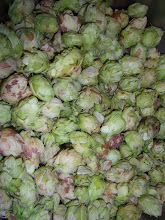 American craft brewing seems the most obvious place to extend the idea. After all, who don’t love saisons? I mean, besides this guy? Although since he hasn’t posted for like six months, that insult is effectively as dead as that blog. Oh, and I included the dandelion flowers as a means to compare the flavor contributions to beer in relation to the contributions from the leaves and roots in 207. Dandelion Saison.
American craft brewing seems the most obvious place to extend the idea. After all, who don’t love saisons? I mean, besides this guy? Although since he hasn’t posted for like six months, that insult is effectively as dead as that blog. Oh, and I included the dandelion flowers as a means to compare the flavor contributions to beer in relation to the contributions from the leaves and roots in 207. Dandelion Saison.
Note: the 30/70 corn to grain ratio might have got some extra traction for me today via today’s stuck sparge. I adjusted the ration for the next version, so we’ll see what happens.
208. American Saison w/ Dandelion Flowers
Mash:
6 lbs. Best Malz Pilsen
3 lbs. flaked maize
Mash @ 150° F for 90 minutes w/ 3 gallons RO water, 4 g. gypsum, & 4 g. CaCl; mash stuck after I collected 1 gallon drained, so I topped it off with sparge water @ 1.080
Batch sparge @ 158° F for 20 minutes w/ 4 ½ gallons RO water; wort collected @ 1.030
Collected 6 ¼ gallons; topped off to 7 gallons, brought to a boil (70 minutes), & added:
w/60 to go: 1 ½ oz. Azacca leaf 9.9% AA
w/60 to go: 1 ½ oz. Azacca leaf 9.9% AA
w/10 to go: 1 oz. Styrian Golding leaf 3.7% AA
5 g. Wyeast yeast nutrient
5 g. Wyeast yeast nutrient
w/5 to go: 1 oz. Styrian Golding leaf 3.7% AA
3 ½ oz. table sugar
w/0 to go: 1 oz. Styrian Golding leaf 3.7% AA
4 oz. dandelion flowers
3 ½ oz. table sugar
w/0 to go: 1 oz. Styrian Golding leaf 3.7% AA
4 oz. dandelion flowers
Let stand for 20 minutes, chilled, & pitched mason jar of saison yeast from 207. Dandelion Saison
Brewed: 4/28/2015
Secondary: 5/26/2015 @ 1.002; dry-hopped w/ 2 oz. Styrian Golding leaf 3.7% AA
Bottle: 5/30/2015 w/ 3.25 oz. table sugar
FG: 1.002
Tasting
Notes (12/15/2015): American Saison w/ Dandelion Flowers pours a hazy straw
with a big white mousse-y head that hangs around, and has plenty of tiny white
bubbles streaming up the sides of the glass. The nose is floral and perfume-y
and lightly spicy all at once; there is a hint of Pilsner sweetness, but the
yeast overpowers much of that. Additionally, there are white pepper phenols with
a hint of clove as well. As it opens up, citrus, lemon zest, earthiness, and dandelion also comes out. There
is nothing here that reads distinctly as corn, although the dandelion flowers
mixed with the yeast does provide some scratchy rusticity. Flavors start with a
hint of banana that leads into a medium grainy Pilsner malt mixed with a soft ephemeral bread crust and lemon zest,
quickly followed by floral spiciness, both from the hops and yeast—I can’t
really distinguish where one begins and the other ends. There might be some
hints of corn sweetness in the final third of the beer, but it is also dry and
crackery via the bright sharp carbonation, and the finish is dry and peppery
with hints of lemon and that Styrian Golding earthy spiciness I find so
beguiling. The main contribution of the corn appears to be lightening the
color and thinning the body of the beer, although I am pretty sure that it
contributes to some of the rustic saison character, as do the dandelion flowers.
And it has a dry body, even by my standards—when I try this again, I will raise
the mash temperature to 152° F to see the affect that has on the mouthfeel of
the beer. I might also try substituting 6-row and some wheat—swing it towards
the grain bill of the American Weissbier—to see how that affects the overall
beer in the glass a well. Still, corn’s presence in beer seems to be more
dependent upon yeast than anything else; as with some of the American
Weissbiers, I am not certain that anyone would readily identify this as having
corn were they not told. But I do like the contribution corn provides, and I’ll
continue to experiment. Stay tuned, y’all.

Have you decided the best way to add the dandelions? Root, leaves, flowers or all of the above?
ReplyDeleteDepends on what you are after; the flowers are more spicy/white pepper with hints of the bitterness found in the leaves, while the leaves provide a more grassy bitterness that can run to vegetal. The flowers at flameout worked well--I might go with 3 oz. next time and see what I think. In this beer, there was a lot to pick apart, and I'm not sure I could definitively say which parts came from where.
ReplyDelete